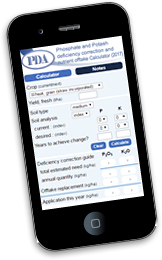PDA News
The PDA publishes both technical News items and shorter Blog items. PDA News provides the latest up to date information on macronutrients and their use, while blog items are shorter and timelier.
If you are in the UK or Ireland and are interested in receiving PDA News items through the post or by email free of charge, then sign up on the contact page. Recipients can receive CPD points for BASIS and NRoSO.
Plant Potassium Measurements
The Fertiliser Manual (RB209) makes recommendations for Phosphate and Potash based on the Index system. This has proved to be the most efficient means of ensuring soils have sufficient available nutrient to optimise crop growth each year, however this one-off assessment may need monitoring to ensure this remains the case for each specific soil type and across the years between sampling and even within fields.
December 2022
Nitrogen Use Efficiency (NUE)
The optimum rate of nitrogen for a crop will depend on many variables, one of which is the efficiency of use. This can vary greatly depending on several factors, including the weather conditions around application, the state and health of the crop and particularly its root system, the product being applied, and the availability of other nutrients.
December 2022
Impact of pH on nutrient availability
When it comes to crop nutrition, soil pH must be considered the starting point, as the availability of all nutrients are affected by the pH of the soil. The optimum availability of most plant nutrients occurs around a neutral pH of 6.5 to 7, however the optimum pH for soils will vary depending on the soil type and the cropping.
October 2022
Pink straw: High potash or something else…?
A defining memory of the 2018 cereal harvest must be the colour of the straw. Social media was alive with pictures of pink looking crops. Rumours followed regarding the reasoning behind this, with higher potash levels coming out on top. Laboratory tests identified higher than average potash levels in the crop residues, further strengthening these theories. So the mystery had been solved. Or had it…
August 2022
Impact of price on nutrition decisions
In such uncertain times placing greater scrutiny on all inputs is understandable. However, farmers must be careful not to reduce inputs which are crucial but, like potash, whose benefits are not visual or directly obvious.
July 2022
Sulphur and nitrogen use efficiency
It is well understood that sulphur is an important nutrient for plant growth and development. Due to the central role of both sulphur and nitrogen in the synthesis of proteins, the supplies of these nutrients in plants are highly inter-related. A shortage in the availability of sulphur will reduce the efficiency of nitrogen use.
June 2022
Price implications for P&K applications
Cost and price rises are a frequent focus in the world right now, but especially within agriculture due to the circumstances in Ukraine and the sanctions imposed on Russia as a result. Although within arable farming, 2022 should produce reasonable returns, livestock farmers may not be so fortunate, whilst there is much greater uncertainty beyond this for all.
May 2022
Potash and sugar beet
During the last four decades, yields of clean beet and sugar in the UK have been increasing linearly, at an average annual rate of 0.8 t/ha of clean beet. In this article, we consider if the currently recommended potash application rates are adequate to support this.
March 2022
Potassium and nitrogen interactions in crops
Nitrogen has hit the headlines in the last few months, not just within agriculture, but across the mainstream media on the back of factory closures. Within agriculture the focus has clearly been on the steep price rises and the resulting impact on the economic optimum rates. These calculations are wholly justified, but as is often the case, are very singular focussed.
December 2021
The release of nutrient reserves in soil
Maintaining the fertility of agricultural soils is of paramount importance, not only for the present but also for the future. Soil analysis, and its interpretation, is an important management tool in assessing the need to apply nutrients to maintain soil fertility.
October 2021
Crop establishment
Establishment is the most critical period in any annual crops life-cycle, as it is the time when the yield potential is set. All challenges the crop faces during the season serves to reduce the final yield from this potential. Therefore, conversely, any management decisions taken from this point onwards only helps limit the reduction in this yield potential.
September 2021
Farming rules for water
More than three years after their introduction, the Farming Rules for Water hit the spotlight due to increasing concerns surrounding the interpretation of the rules by the Environment Agency. Although manures are a good source of nutrients for crops, there is increasing scrutiny on their usage as farmers are encouraged to fully account for the nutrients they supply and closer match the timing of application to the soil or crop need.
September 2021

